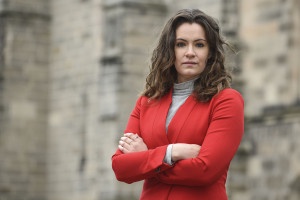Being chosen as a ‘Future Leader’ by the British Council coincided serendipitously with the LLM in International Commercial Law with Professional Skills [Arbitration] I began in 2017. ‘Future Leaders Connect’ ran for the first time as a nine-day residential program during October 2017 designed by the British Council to promote policy leadership amongst ‘Future Leaders’ in various policy fields. 50 members met in the UK for nine days of activities, travelling from Egypt, India, Indonesia, Kenya, Mexico, Morocco, Nigeria, Pakistan, Tunisia, USA, and across the UK to be part of the global network of emerging policy leaders. Thanks must go to the School of Law which was supportive in facilitating the trip halfway through a semester!
To qualify for the program – as one of two Scottish delegates – I submitted a policy idea related to the UK Government Department for International Development ’s 2017 Economic Strategy on leveraging development funding by working with the private sector in priority areas including large-scale infrastructure projects in developing countries. In my mind, potential issues include failure to deliver on contracts and issues of accountability on a global scale; likely implications include the emergence of a new genre of legal issues with negative impacts for the poorest of the poor. Potential issues can be addressed with effective, accountable, and targeted policy and are the kind of issues investigable with an LLM in International Commercial Law. The Future Leaders Connect programme also provided a platform to discuss these ideas with participants and sector experts.
The most important lesson I learned from the Program was to identify the ‘little big thing’ – one small thing that can be changed as steps are made towards developing bigger global changes through effective policy implementation. These ideas were shared over the first five days of the program at the Møller Centre at the University of Cambridge where we considered what it means to be a leader, methods for researching policy, and engaging people. After the theory and research, we went to London to visit No.10 Downing Street, the Houses of Parliament, the BBC, and take part in the #WalkTogether event involving Kofi Annan and Richard Branson. At Parliament, groups were set up to develop policy ideas with Members of Parliament – working with Baroness Uddin, our group discussed future policy ideas around artificial intelligence to create three specific recommendations to present at a panel discussion; this took our theory, learning, and engagement experiences full circle.
Most of the value came from the networking, mixing of different cultures, backgrounds, disciplines, and expertise which helped me develop both hard skills to build on my academic interests, underpinned by new theoretical approaches, and appreciate the value of influence and networking through soft power. I learned to recognise the fluidity of leadership and power, particularly how to fill spaces to take responsibility and strategically ride the tides of leadership, as opposed to trying to force management opportunities. The opportunity helped my professional development because it legitimised policy concerns I’ve developed through professional experience and academic curiosity; the Program provided the opportunity to escalate these issues and legitimised our concerns.
A common query amongst all the Future Leaders was understanding what had made our applications stand out and why were we selected. It seemed obvious to me why the others were selected; they are remarkable. All the future leaders shared the attitude of being less preoccupied with being out in front; instead, our primary interests are the disciplines in which we are actively engaged. If you want to apply for the Future Leaders Connect Program in 2018; do it – I didn’t think I’d be accepted onto the program, or that I qualified as a ‘Future Leader’.
For more information visit www.britishcouncil.org and/or follow #futureleadersconnect
Author Profile
Emma Jones is working towards an LLM in International Commercial Law with Arbitration at the University of Aberdeen, having returned from working in Kampala – Uganda for two years on public policy issues related to democratic governance, peace, and security for Advocates Coalition for Development and Environment [ACODE]. Prior, Emma earned a first-class BA in Development and Peace Studies at the University of Bradford, undertaking internships in the development sector alongside study. Her interests include the impact of and relationship between the public and private sector in leveraging development capital, and mitigating of negative impacts on vulnerable global populations. Get in touch at e.jones.16@aberdeen.ac.uk
This blog post is by Emma Jones.



